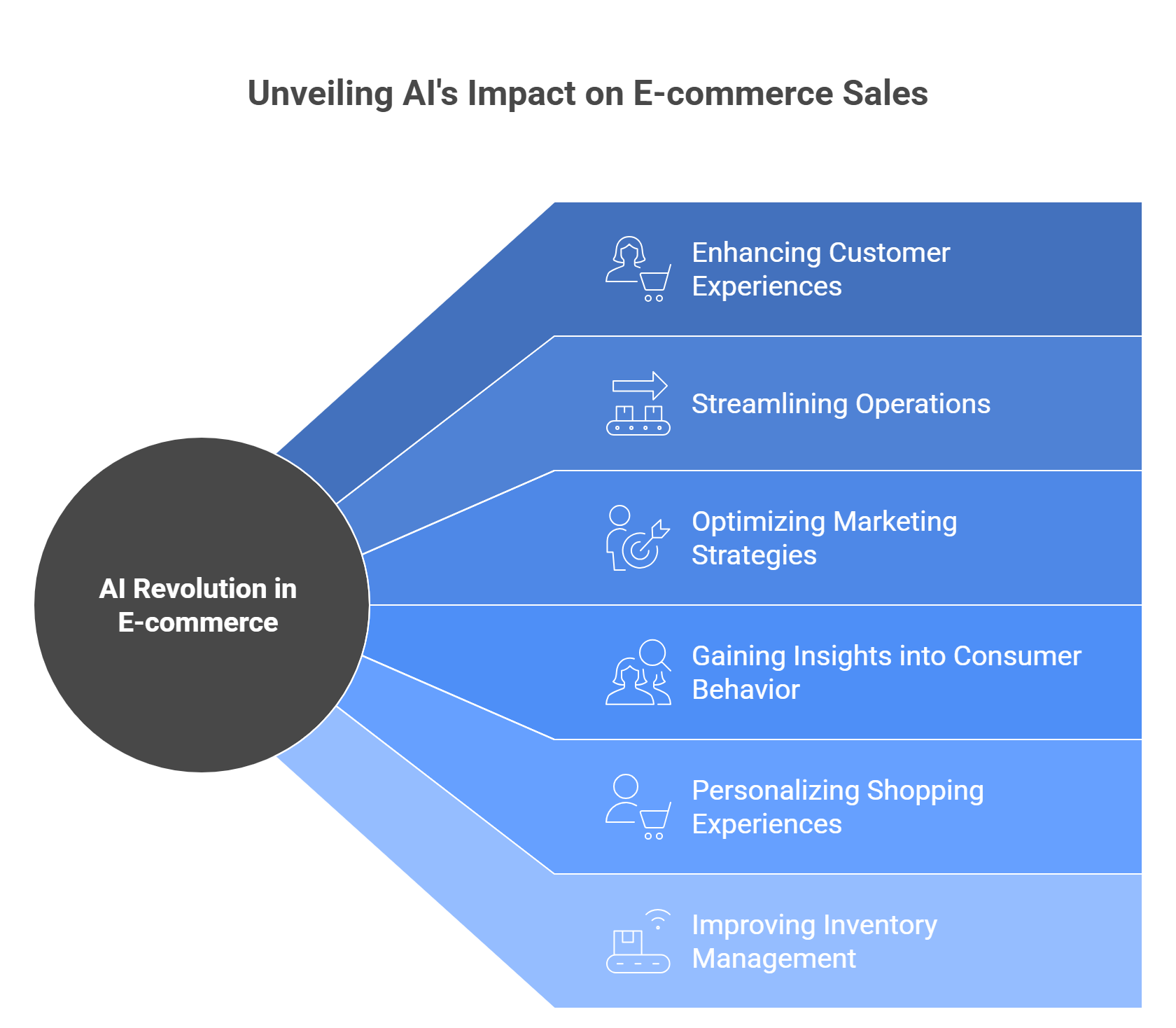
The AI Revolution in E-commerce: 9 Key Factors to Supercharge Your Sales in 2025
Artificial Intelligence (AI) is no longer a futuristic buzzword whispered in tech circles. It’s the powerful engine running quietly behind the world’s most successful e-commerce businesses. For online retailers, AI has shifted from a competitive advantage to a fundamental requirement for survival and growth. In a market where 87% of retailers have already integrated AI into their operations, the question is no longer if you should adopt AI, but how you can leverage it to dominate.
The pressure is on. Today’s consumers demand hyper-personalized experiences, instant support, and seamless shopping journeys. A staggering 75% of customers are more likely to buy from a brand that personalizes their experience. Meeting these expectations at scale is impossible without AI. From boosting conversion rates to slashing operational costs, AI is the key to unlocking unprecedented efficiency and customer loyalty.
This comprehensive guide will explore the nine critical AI factors that are transforming e-commerce, the tangible benefits they deliver, and how you can strategically navigate the challenges to build a smarter, more profitable online business.

Your AI Toolkit: 9 Ways to Optimize E-commerce and Sales
AI is not a single tool but a suite of powerful capabilities that can be applied across your entire business. Here are the core applications that are delivering the biggest impact on sales and optimization right now.
1. Hyper-Personalization: The End of One-Size-Fits-All Shopping
Generic shopping experiences are dead. AI-powered recommendation systems are the new standard, acting as personal shoppers for every visitor. By analyzing browsing history, past purchases, and even how a user describes a product, AI delivers hyper-targeted suggestions that feel intuitive and helpful.
- How it works: Think of Amazon, which attributes a massive 35% of its sales to its recommendation engine. AI can power dynamic homepage carousels, suggest “Pairs well with…” items on product pages, and send personalized follow-up emails with products you’re actually interested in.
- The Payoff: This level of personalization leads to a 10-30% boost in marketing efficiency and a significant increase in Average Order Value (AOV). It’s about making customers feel seen and understood, which builds loyalty and drives repeat business.
2. Conversational Commerce: Your 24/7 AI Sales Assistant
Imagine having a top-performing sales assistant who works 24/7, never takes a break, and can handle thousands of conversations at once. That’s the power of AI chatbots and virtual assistants. These tools have evolved from simple FAQ bots to sophisticated sales enablers.
- How it works: Modern AI assistants can greet visitors, recommend products, process orders, and answer post-purchase questions like “Where is my package?”. Shopify Inbox, for example, is credited by merchants for “rescuing sales” by providing instant answers and preventing cart abandonment.
- The Payoff: A McKinsey study found that generative AI assistants helped agents resolve 14% more tickets per hour. Furthermore, they can reduce the cost per customer interaction by nearly 50%, all while improving customer satisfaction and capturing sales that would otherwise be lost.
3. Dynamic Pricing: Maximize Profit in Real-Time
Static pricing is a relic of the past. AI algorithms can analyze market demand, competitor pricing, inventory levels, and consumer behavior in real-time to set the optimal price for every product at any given moment.
- How it works: This allows for instantaneous competitor price matching, surge pricing during peak demand, and smart markdowns to clear old inventory efficiently. Amazon’s Price Optimizer is a prime example, adjusting prices multiple times a day to maximize both sales and profits.
- The Payoff: Dynamic pricing ensures you’re never leaving money on the table or losing out to competitors. It gives you an agile, responsive revenue management system that maximizes profitability.
4. Intelligent Forecasting: End Stockouts and Overstock Forever
Stockouts lead to lost sales and frustrated customers. Overstocking ties up capital and wastes warehouse space. AI solves this billion-dollar problem with highly accurate demand forecasting.
- How it works: By analyzing historical sales data, market trends, and even external factors like holidays or weather patterns, AI can predict future demand with remarkable precision. This enables automated replenishment and optimized inventory levels.
- The Payoff: This minimizes warehouse delays, reduces spoilage or dead stock, and improves overall supply chain efficiency. You get the right products in the right place at the right time.
5. Generative AI: Your Automated Content & Marketing Engine
Content creation is one of the most time-consuming tasks for e-commerce brands. Generative AI is changing the game by automating the production of high-quality, on-brand content at an incredible scale.
- How it works: AI can write compelling product descriptions, draft email campaigns, create ad copy, and even generate lifestyle images or swap product backgrounds. H&M uses its “Cherry” software to generate product descriptions directly from images, saving countless hours.
- The Payoff: This dramatically reduces the time and resources needed for content development, ensures brand consistency across thousands of SKUs, and supports SEO efforts with fresh, relevant copy.

6. Advanced Search: Help Customers Find What They Want, Faster
If customers can’t find it, they can’t buy it. AI is revolutionizing site search with visual, voice, and contextual capabilities that make product discovery intuitive and frictionless.
- How it works: Visual search, like ASOS’s “Style Match,” lets users upload a photo to find similar products. Voice search allows customers to add items to their cart via assistants like Alexa. AI also personalizes text search results based on user behaviour.
- The Payoff: Advanced search significantly improves the search-to-cart conversion rate. It removes friction from the discovery process, leading to a better shopping experience and more sales.
7. AI-Powered Security: Proactive Fraud Detection
E-commerce fraud is a constant threat. AI acts as a vigilant security guard, processing vast amounts of transaction data in real-time to identify and block fraudulent activity before it happens.
- How it works: AI models learn normal customer behaviour and can instantly flag anomalies, such as unusual purchase volumes or mismatched shipping and billing information. PayPal’s deep learning system is a prime example, constantly adapting to new threats.
- The Payoff: AI prevents costly chargebacks, protects your business’s reputation, and secures customer data—all without disrupting the checkout experience for legitimate buyers.
8. Smart Lead Qualification: Focus on Your Hottest Prospects
For B2B e-commerce, not all leads are created equal. AI lead scoring systems analyze customer data and behaviour to automatically identify which prospects are most likely to convert, allowing your sales team to focus its energy where it matters most.
- How it works: Tools like Salesforce Einstein and HubSpot AI analyze engagement, demographics, and interaction history to assign a priority score to each lead.
- The Payoff: This improves sales productivity, optimizes the conversion funnel, and ensures your team is engaging high-potential customers, not wasting time on cold leads.
9. Omnichannel Mastery: A Seamless Experience Everywhere
Customers interact with your brand across multiple touchpoints—mobile, desktop, and in-store. AI is the key to unifying these experiences, ensuring they are consistent, cohesive, and personalized.
- How it works: By consolidating customer data from all channels into a single platform, AI can orchestrate a seamless journey. A product viewed on a mobile app can trigger a personalized email offer, which can then be redeemed in-store.
- The Payoff: This meets the high consumer expectation for a frictionless omnichannel experience, enhancing brand consistency and boosting customer satisfaction across the board.
The Smart Way Forward: Navigating AI Challenges & Ethics
While the benefits of AI are undeniable, a successful rollout requires a thoughtful approach to its challenges. Ignoring these can erode customer trust and undermine your efforts.
- Data Privacy & Security: AI runs on data, making security paramount. Businesses must implement robust encryption, secure storage, and strict access controls to protect customer information and comply with regulations like GDPR. Trust is your most valuable asset; protect it fiercely.
- Algorithmic Bias: An AI is only as good as the data it’s trained on. If the data contains historical biases, the AI can perpetuate unfair outcomes. Regular audits and human oversight are essential to ensure your AI treats all customers equitably.
- Implementation Costs: AI can be a significant investment. Start by focusing on applications with a clear and immediate ROI, such as chatbots or personalization engines, before moving to more complex integrations.
- Transparency and Trust: Be open with your customers about how you use AI. Explain how their data is used to create a better shopping experience and give them clear control with opt-out options. Transparency builds trust.
- The Human Touch: AI is a powerful tool, not a replacement for your team. The future is about human-AI collaboration. Automate repetitive tasks to free up your employees to focus on what they do best: complex problem-solving, creativity, and building genuine customer relationships.

The Future is Here: Your Roadmap to an AI-Powered Business
Artificial intelligence is rapidly becoming the foundational operating system for modern retail. It connects, optimizes, and automates every facet of your business, from the supply chain to the checkout cart. The businesses that thrive in the coming years will be those that move beyond seeing AI as a collection of tools and embrace it as a core strategic partner.
By prioritizing AI investments with a clear ROI, building robust data governance, committing to ethical practices, and fostering a culture of human-AI collaboration, you can unlock sustained growth. The AI revolution is here. It’s time to harness its power to create exceptional customer experiences, drive unparalleled efficiency, and secure your leadership in the dynamic world of e-commerce.

